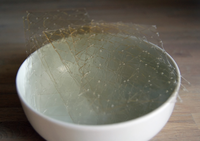
Photo from wikipedia
The rapid development in micro-machinery enabled the investigation of smart materials that can embody fast response, programmable actuation, and flexibility to perform mechanical work. Soft magnetic actuators represent an interesting… Click to show full abstract
The rapid development in micro-machinery enabled the investigation of smart materials that can embody fast response, programmable actuation, and flexibility to perform mechanical work. Soft magnetic actuators represent an interesting platform toward combining those properties. This study focuses on the synthesis of micro-actuators that respond to thermal and magnetic stimuli using micro-molding with a soft template as a fabrication technique. These microsystems consist of a hydrogel matrix loaded with anisotropic magnetic nanospindles. When a homogeneous magnetic field is applied, the nanospindles initially dispersed in monomer solution, align and assemble into dipolar chains. The ensuing UV-polymerization creates a network and conveniently arrests these nanostructures. Consequently, the magnetic dipole moment is coplanar with the microgel. Varying the shape, volume, and composition of the micro-actuators during synthesis provides a temperature-dependent control over the magnetic response and the polarizability. Beyond isotropic swelling, shaping the hydrogel as long thin ribbons with a passive layer on one side allows for differential swelling leading to bending and twisting deformations, for example, 2D- or 3D-spiral. These deformations involve a reversible amplification of the magnetic response and orientation of the hydrogels under magnetic field. Temperature control herewith determines the conformation and simultaneously the magnetic response of the micro-actuators.
Journal Title: Small
Year Published: 2023
Link to full text (if available)
Share on Social Media: Sign Up to like & get
recommendations!